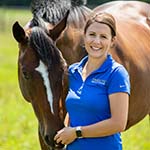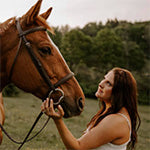Digestive health is critical to a horse’s well-being, performance, and comfort.
Unfortunately, many horses suffer from gastrointestinal issues, all of which can be painful, potentially dangerous, and costly to manage.
Numerous environmental and nutritional factors often trigger these problems. Feeding horses with sensitive digestive systems requires a thoughtful, consistent approach that supports gut health from front to back.
In this guide, we’ll explore common digestive issues in horses, explain why they occur, and provide science-backed feeding recommendations to help horses with digestive sensitivities feel and perform their best.
Understanding Common Horse Stomach and Digestive Problems and Why They Occur
Digestive upset in horses involves a range of problems that interfere with the horse's ability to properly process food and absorb nutrients, often resulting in discomfort and, in some cases, serious health complications.
Some of the most common digestive problems in horses include:
- Colic: Abdominal pain, encompassing various gastrointestinal conditions.
- Ulcers: Gastric ulcers, also known as Equine Gastric Ulcer Syndrome (EGUS), are a common and painful condition in horses. They involve sores or lesions that form in the stomach lining.
- Diarrhea: An increase in feces' frequency and water content, often signaling a problem in the horse's digestive system.
- Colitis: Inflammation of the colon in horses, leading to symptoms like diarrhea, fever, and abdominal pain.
Several factors can trigger digestive upset in horses, including:
- Poor Diet: Feeding too much grain, providing inadequate forage, poor feeding management, or offering poor-quality horse feed or forage can disrupt the digestive system’s delicate balance.
- Stress: Travel, confinement, competition, or sudden changes in routine can stress the horse and negatively affect digestion.
- Dental Issues: Dental disease or poorly maintained teeth can prevent horses from chewing food properly, contributing to digestive problems.
- Parasites: Intestinal parasites can irritate the gut lining, reduce nutrient absorption, and lead to various digestive issues.
- Infections: Bacterial, viral, or parasitic infections can inflame the digestive tract, causing symptoms like diarrhea and colic.
- Other Factors: Exposure to toxins, the use of certain medications, or physical injuries can also disrupt normal digestive function.
One often-overlooked factor in digestive health is the role of movement in promoting gut motility. Horses are naturally designed to graze and move continuously throughout the day, sometimes covering long distances to find food in the wild.
While round-the-clock turnout may not be feasible for every horse or facility, increasing your horse’s daily movement can make a significant difference. Options like dry lot turnout, stall runs, mechanical walkers, or even regular hand-walking can help support digestive function, especially in horses with a history of impaction or gas colic.
What to Feed and Supplement a Horse with Digestive Sensitivities
Feeding a horse with a sensitive digestive system might seem straightforward (stick to the basics of good nutrition), but many horse owners don’t follow those basics closely enough to fully support the needs of a horse prone to digestive issues.
A good nutrition program should include the following:
- Consistent access to pasture or hay so the horse doesn’t go for long periods with an empty stomach
- Clean, high-quality hay free from dust, mold, weeds, or debris.
- A gradual transition when introducing new feed or forage to avoid upsetting the digestive system.
- Multiple small meals throughout the day instead of one or two large feedings.
- Feed choices tailored to your horse’s needs, such as age, activity level, and health conditions.
All Tribute® Superior Equine Nutrition products include Equi-Ferm XL®, a researched ingredient shown to help maintain a healthy microbial balance in the hindgut, particularly during stressful events. Equi-Ferm XL®, Foal Paste and Constant Comfort® can support horses with digestive issues.
Synergize™, Kalm 'N EZ® Pellet, Seniority® Pellet, Senior Sport®, Kalm Ultra®, and Growth Pellet feeds by Tribute® all contain Constant Comfort®, a premium calcium source derived from seaweed. This buffers stomach acid for 2–4 hours after a meal, helping to protect horses prone to ulcers and digestive issues. It can also contribute to better overall performance by supporting a healthier stomach and a more balanced digestive system.
Adding prebiotics and probiotics can help support the overall health of the digestive system, with significant benefits for the hindgut. For optimal gut health, especially for those prone to stomach problems or digestive upset, pair these feeds with Constant Comfort® Plus, Block, and Paste Products.
What to Feed a Horse with Ulcers
More than 90% of performance horses and up to 50% of horses in light work develop gastric ulcers.
All horses should have consistent, free-choice access to hay or pasture grass daily to help prevent ulcers. For horses on restricted diets, such as those undergoing intentional weight loss, feeding small, frequent meals is essential to minimize the time their stomachs remain empty. Ideally, horses should not go for more than 4 hours without eating.
Horses prone to ulcers often do better on lower NSC feeds (non-structural carbohydrates, which include sugars and starches). Sugar, in particular, can ferment in the stomach and produce volatile fatty acids (VFAs), which may worsen the damaging effects of stomach acid on the sensitive, non-glandular part of the stomach.
For hard keepers with a history of ulcers, choosing calorie-dense feeds like Tribute's Senior Sport®, Synergize®, or Resolve® that provide energy through fat and fiber instead can help. Feeding lower-NSC diets, offering smaller meals, and providing constant access to forage can all help reduce the risk of returning ulcers. However, it’s important to remember that nutrition and feeding management are just one piece of the puzzle when managing ulcers in horses.
What to Feed a Horse with Diarrhea or Loose Manure
The horse’s hindgut is home to a diverse community of microbes that help break down forage and convert it into usable energy. When the hindgut is disrupted, it can lead to issues like certain types of colic or chronic diarrhea.
The best way to maintain a healthy hindgut is by feeding high-quality fiber. If hay quality is poor or the horse struggles to consume enough long-stemmed forage, choose high-fiber feeds from easily digestible sources.
Hay with a higher water-holding capacity can help improve fecal consistency in horses with loose stools, such as grass hays like Timothy hay, over Alfalfa hay. Short-fiber hay cubes, pellets, or chopped hay are also generally recommended over long-fiber hay for horses with gastrointestinal issues.
Grains and other horse feeds can also lead to diarrhea if they contain high levels of starch and sugar, which may upset the balance of microbes in the hindgut. Tribute offers a range of fiber-rich, low-sugar and starch options to suit different horses' needs, including Seniority® Low NSC, Senior Sport®, Resolve®, and Wholesome Blends® Senior.
Adding additional support from the Constant Comfort® supplements will further support the health of the entire digestive tract, including particular benefits to the hindgut.
What to Feed a Horse with Colitis
Infections, toxins, or other factors can cause colitis in horses. Severe cases, such as those historically termed "Colitis-X," can result in rapid deterioration and require immediate veterinary attention.
A diet rich in easily digestible fiber and low in starch is essential for a horse with colitis. Offering a variety of feed options can help encourage consistent eating. Prioritize forage-based feeds, such as, grass and hay, and consider adding probiotics and gut-supporting supplements to promote digestive health.
Tribute provides a variety of fiber-rich, low-sugar and starch feeds tailored to meet the needs of different horses, including Seniority®, Senior Sport®, Resolve®, and Wholesome Blends® Senior.
Avoid sudden changes to a horse’s feed or forage, as abrupt diet shifts can upset the gut microbiome. Instead, introduce new feeds slowly over 7–10 days.
What to Feed Horses Prone to Colic
Colic is one of the most common digestive problems in horses and can range from mild discomfort to life-threatening situations. Signs of colic include pawing, looking at the flank, rolling, and losing appetite.
Horses especially prone to colic do best on a highly consistent diet. Fixed-formula feeds—meaning each bag contains the same ingredients every time—help ensure consistent digestion and nutrient delivery. It's also important to introduce any new diet changes slowly and carefully.
Generally, it's best to avoid feeds high in non-structural carbohydrates (NSC), including sugars and starches. Examples of high-NSC feeds are straight grains like corn, oats, and barley, traditional sweet feeds, and some pelleted feeds with high molasses inclusion. Diets high in NSC can increase the risk of stomach ulcers, hindgut imbalance, and colic.
Instead, choose feeds with lower NSC levels—typically under 20%, though even lower may be necessary for some horses—that are rich in digestible fiber. Options like Kalm ‘N EZ®, Senior Sport®, and Synergize™ Pellet offer this balance. Tribute’s feeds are also fixed-formula to further support consistency in digestion and nutrition.
Good digestible fiber sources, such as soy hulls, dehydrated alfalfa, and beet pulp, can also help maintain hindgut health. Additionally, feeds containing prebiotics and probiotics support the overall digestive system.
Get a Tailored Feed Plan with Tribute Equine
It can be challenging to own a horse prone to digestive upset and stomach issues, especially when it comes to choosing the proper type and amount of horse feed and supplements.
At Tribute®, we will help you create personalized feeding plans tailored to your goals and your horse’s needs and health conditions. Reach out today!


